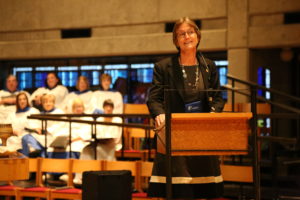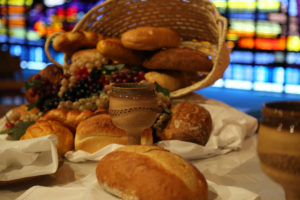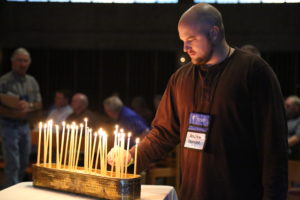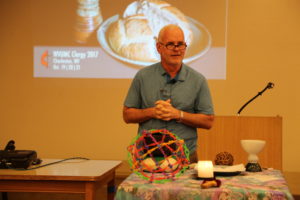“Gathering in Grace” was an appropriate title for the event held October 19-21 at Christ United Methodist Church in 
Charleston. We spent much time in worship, and meaningful prayer experiences were woven throughout each day. Our Bishop’s message during the opening worship reminded us of the importance of abiding as we face trying times, and the workshop leaders equipped us to work through chaos and controversies in a manner that honors God and nurtures relationships.
Bishop Sandra Steiner Ball recognized the anxiety prevalent in the world and the Church, and she reminded us how that anxiety can color all of life. She referred to the John 15 passage on the vine and branches and used this passage to remind us we have a choice. We often focus on productivity as our version of fruitfulness, but the passage points us toward abiding in Christ and embracing pruning as the path toward greater fruitfulness.
The productivity our culture is so addicted to stands in the way of fruitfulness. It often becomes an attempt to predict and control the future, and leads to conflict and judgmental attitudes. It devalues relationships and often leads to a discomfort with pruning and anxiety. We are threatened by these things, and often scapegoat the agents of change who seek to lead us in new directions.
This passage invites us to realize that true fruitfulness is not something we crank out through sheer effort in order to  appease God, but rather a work of God that flows out of our abiding in a relationship with Christ our source. Putting our priority on abiding, especially when that impacts productivity, calls for great trust. Shifting our focus and opening ourselves to God’s pruning work in chaotic times isn’t necessarily pleasant. However, for those who are willing to embrace the discomfort and move forward, these shifts hold the promise of moving from productive transactions to deep and intimate relationships, and to authentic fruitfulness.
appease God, but rather a work of God that flows out of our abiding in a relationship with Christ our source. Putting our priority on abiding, especially when that impacts productivity, calls for great trust. Shifting our focus and opening ourselves to God’s pruning work in chaotic times isn’t necessarily pleasant. However, for those who are willing to embrace the discomfort and move forward, these shifts hold the promise of moving from productive transactions to deep and intimate relationships, and to authentic fruitfulness.
Bishop Steiner Ball invited us to stay connected. She encouraged us to focus on the quality of our lives, rather than upon quantity; and to embrace the fear and anxiety, as we allow God to prune our lives and make us more fully alive. God longs for us to enjoy relationships of mutual abiding with Jesus and with one another. Through these choices, we will glorify God through our fruitfulness, and we will light the way for others to find  life abundant and eternal.
life abundant and eternal.
As I listened to the Bishop’s words I heard a truth much needed, by our church and by our world. I feel the addictive pull toward a life based on productivity, but I have also experienced the joy and life-giving power of abiding. My guess is that we all face that struggle, and I believe our success in choosing well in this area will greatly impact our future, as individuals and as a church.
Our presenters, Stephanie Hixon and Craig Gilliam of Just Peace, complimented the Bishop’s message as they shared healthier ways of dealing with conflict. They reminded us that dealing with conflict in a healthy manner can transform relationships and create a stronger community. While higher levels of anxiety normally lead toward greater reactivity and less healthy ways of relating, we can choose to create spaces and embrace processes that keep us on course during trying times. Stephanie and Craig shared techniques and principles but stressed that it was more about a way of being and of staying prayerful and centered in all our interactions. They spoke of the power of a peaceful presence to transform conflicted situations and shared ways to remain that peaceful presence.
 The presenters encouraged us to remain open, listen well, and reflect upon others’ views. Tolerance and a curiosity as to why others held certain beliefs were also mentioned as helpful. They emphasized the need to see others as people, not as objects or obstacles. They encouraged a positive and objective approach and warned against questioning the character or motives of those with whom we disagree. Stephanie and Craig also shared how adequate rest and spiritual disciplines could strengthen us and help us avoid getting pulled in by the anxiety.
The presenters encouraged us to remain open, listen well, and reflect upon others’ views. Tolerance and a curiosity as to why others held certain beliefs were also mentioned as helpful. They emphasized the need to see others as people, not as objects or obstacles. They encouraged a positive and objective approach and warned against questioning the character or motives of those with whom we disagree. Stephanie and Craig also shared how adequate rest and spiritual disciplines could strengthen us and help us avoid getting pulled in by the anxiety.
Some of the content was new, but this may have been more of a refresher for many of those gathered. Most have had some training in conflict resolution and communication, and a few have had extensive training. I still think this was greatly needed, and I wish more of my colleagues had made the most of this opportunity. We may know the right things to do and may have even taught others, but that doesn’t mean we do them. In conversations over controversial issues, I routinely hear those in the church questioning the character or motives of those with whom they disagree. Many appear most concerned with proving their point and don’t seem to listen deeply or seek to understand the other person’s position.
I struggle with the same temptation and am beginning to understand why I feel this pull. There is something very comfortable about being certain, and I like to believe I have the truth. If I admit the person I disagree with is as wise and faithful as I am, perhaps to an even greater degree, then I have a much weaker basis for assuming I am right and they are wrong. There may also be a subtle fear that being wrong in certain areas makes the rest of my belief system suspect. It’s easier just not to go there.
Yet assuming we’re right, especially when we’ve settled for easy answers that come from culture or community, can have a high cost. When we divide into smaller and smaller groups, each certain that we are right, it disconnects us from one another and from the greater truth that can only be found in community. It’s up to each of us to acknowledge our limited understanding; and to search, pray, study, and come together in holy conferencing as we seek to more fully discern the truth. When we do this and still fail to reach a degree of consensus, perhaps there is integrity in acknowledging that as a community we’ve failed to discern the truth in this situation. Becoming comfortable with a certain measure of mystery and ambiguity may be threatening, but it may also lead to a more expansive faith and a far deeper experience of community.
To view photos from this event, click here.